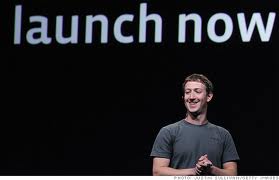
New York, May 18: Facebook's initial public offering of stock is shaping up to be one of the largest ever. The world's definitive online social network is raising at least $16 billion for the company and its early investors in a transaction that values Facebook at $104 billion.
It's a big windfall for a company that began eight years ago with no way to make money.
Facebook priced its IPO at $38 per share on Thursday, at the high end of expectations. The IPO values Facebook higher than Amazon.com and other well-known companies such as Kraft, Disney and McDonald's.
Facebook's stock is expected to begin trading on the Nasdaq Stock Market sometime Friday morning under the ticker symbol "FB." That's when so-called retail investors can try to buy the stock.
Facebook's offering is the culmination of a year's worth of Internet IPOs that began last May with trailblazer LinkedIn Corp. Since then, a string startups focused on the social side of the Web have gone public, with varying degrees of success. It all led up to Facebook, the company that's come to define social networking.
"They could have gone public in 2009 at a much lower price," said Nick Einhorn, research analyst at IPO investment advisory firm Renaissance Capital. "They waited as long as they could to go public, so it makes sense that it's a very large offering."
Facebook Inc. is the third-highest valued company to ever go public, according to data from Dealogic, a financial data provider. Only the two Chinese banks have been worth more. At $16 billion, the size of the IPO is the third-largest for a US company. The largest U.S. IPO is Visa, which raised $17.86 billion in 2008. No. 2 is power company Enel and No. 4 is General Motors, according to Renaissance Capital.
The $38 is the price at which the investment banks orchestrating the offering will sell the stock to their clients. If extra shares reserved to cover additional demand are sold as part of the transaction, Facebook Inc. and its early investors stand to reap as much as $18.4 billion from the offering.
For the Harvard-born company that reimagined online communication, the stock sale means more money to build on the features and services it offers its 900 million global users. It means an infusion of funds to hire the best engineers to work at its sprawling Menlo Park, California, headquarters, or in New York City, where it opened an engineering office last year.
And it means early investors, who took a chance seeding the young social network with start-up funds six, seven and eight years ago, can reap big rewards. Peter Thiel, the venture capitalist who sits on Facebook's board of directors, invested $500,000 in the company back in 2004. He's selling nearly 17 million of his shares in the IPO, which means he'll get some $640 million.
The offering values Facebook, whose 2011 revenue was $3.7 billion, at as much as $104 billion. The sky-high valuation has its skeptics, who worry about signs of a slowdown and Facebook's ability to grow in the mobile space when it was created with desktop computers in mind. Rival Google Inc., whose revenue stood at $38 billion last year, has a market capitalization of $207 billion.
"There seems to be somewhat of a hype around the stock offering," says Gartner analyst Brian Blau. That, of course, is an understatement.
Facebook's IPO dominated media coverage in the weeks and days leading up to the event. Zuckerberg's hoodie made headlines as did General Motors' decision to stop advertising on the site and rival Ford's affirmation that its Facebook ads have been effective.
There are a few reasons for the exuberance. First, there's Facebook's sheer size and high profile. The company grew from a college-only social network created in Zuckerberg's dorm room at Harvard in 2004 to an Internet phenomenon embraced by legions of people, from teenagers to grandmothers to pro-democracy activists in the Middle East.
Secondly, it's personal.
"It's probably one of the first times there has been an IPO where everyone sort of has a stake in the outcome," Blau says. While most Facebook users won't see a penny from the offering, they are all intimately familiar with the company, so it resonates as something they understand.
And then there's CEO Mark Zuckerberg, who turned 28 on Monday. He has emerged as the latest in a lineage of Silicon Valley prodigies who are alternately hailed for pushing the world in new directions and reviled for overstepping their bounds. He counted the late Apple CEO Steve Jobs among his mentors and he became one of the world's youngest billionaires, at least on paper, well before Facebook went public. A dramatized version of Facebook's founding was the subject of a Hollywood movie that won three Academy Awards last year, propelling Zuckerberg even further into the public spotlight.
Though Zuckerberg is selling about 30 million shares, he will remain Facebook's largest shareholder. He set up two classes of Facebook stock, building on the model Google co-founders Larry Page and Sergey Brin created as part of the online search leader's 2004 IPO. The dual class structure helps to ensure that he and other executives keep control as the sometimes conflicting demands of Wall Street exert new pressures on the company.
As a result, with the help of early investors who've promised to vote their stock his way, Zuckerberg will have the final say on how nearly 56 percent of Facebook's stock votes.
True to form, Zuckerberg and Facebook's engineers are ringing in the IPO on their own terms. The company is holding an overnight "hackathon" Thursday, where engineers stay up writing programming code to come up with new features for the site. On Friday morning, Zuckerberg will ring the Nasdaq opening bell from Facebook's headquarters.





Comments
Add new comment